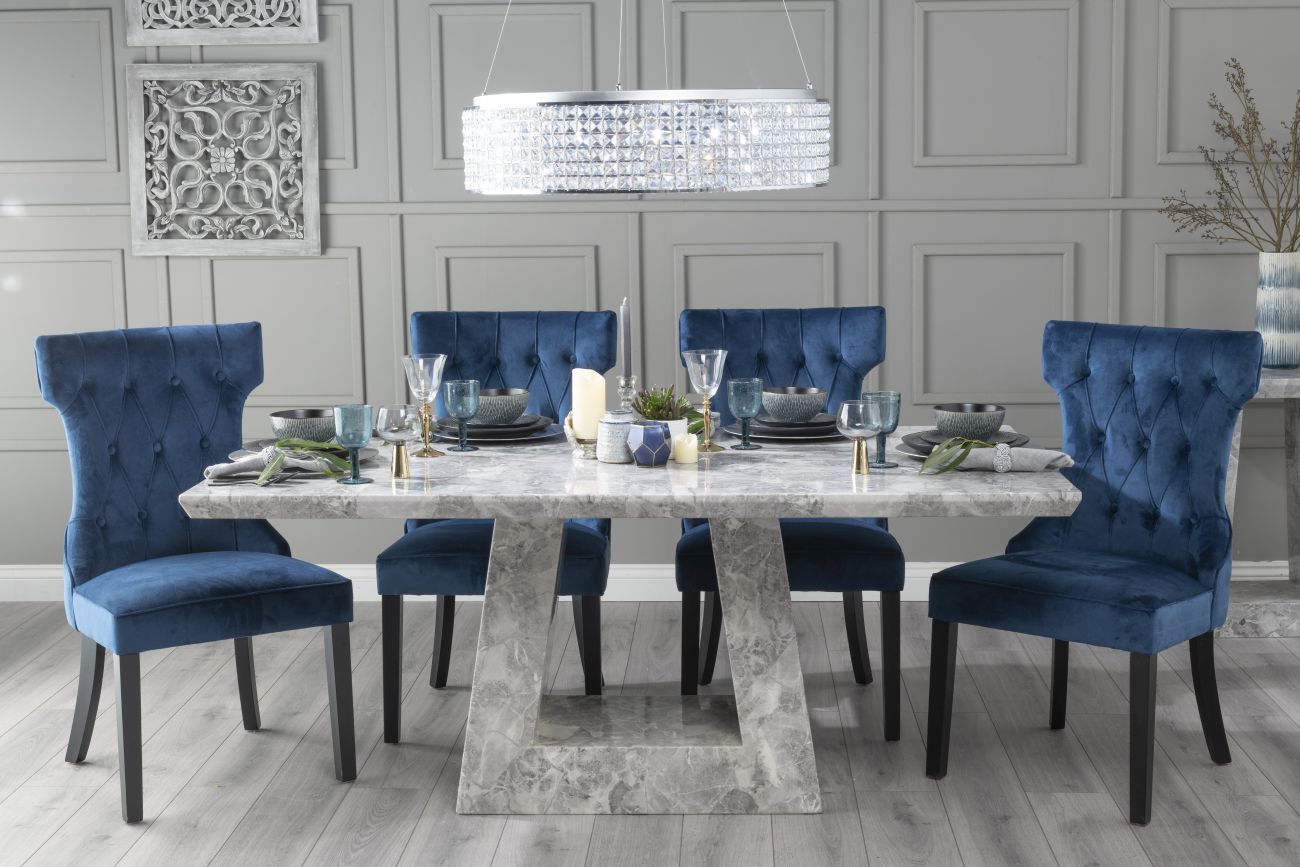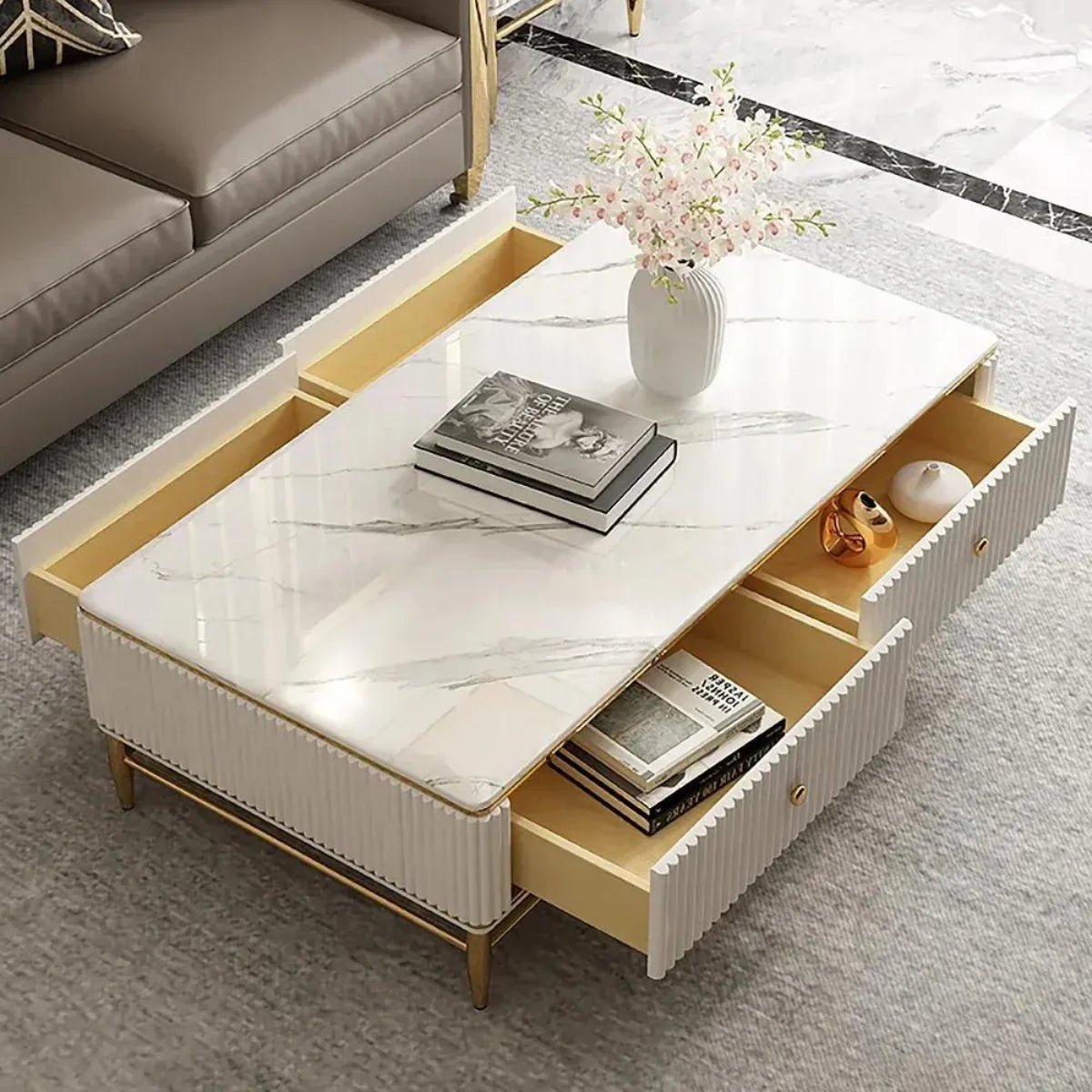When clients approach me with questions about selecting the ideal dining table, most aren’t aware of the profound impact their choice will have on the atmosphere of their dining space and the interactions that will take place around it.
The shape of your table is not just a matter of personal taste. Whether you opt for rectangular, round, or oval designs, each creates a different social dynamic. Your table choice isn’t simply about appearance—it’s about establishing the environment where cherished memories will unfold, from quiet dinners to larger social events. Just as with any well-crafted stage, the design must balance form and function.
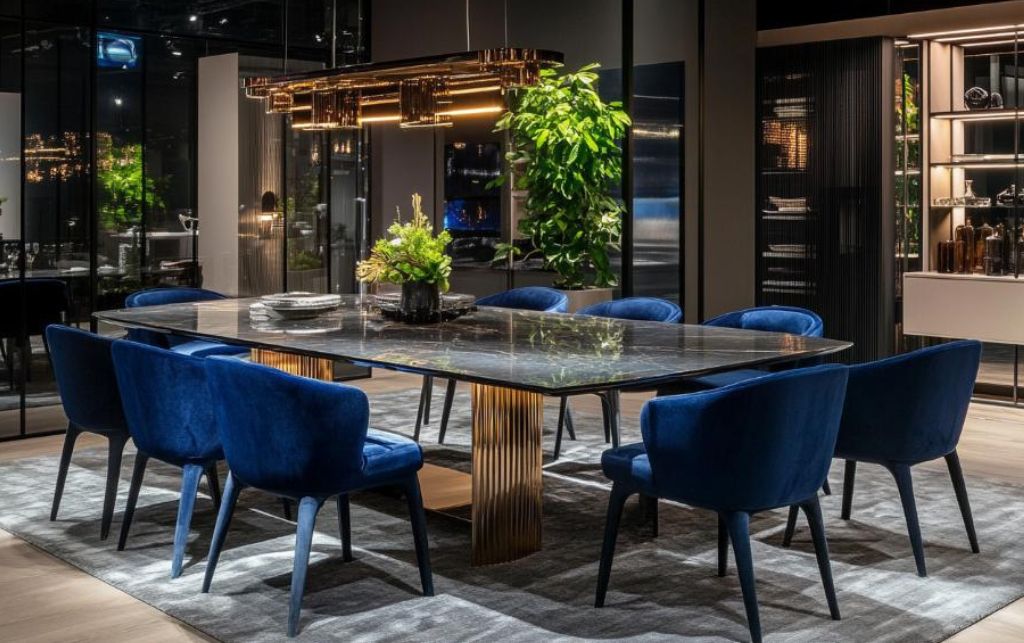
The Rectangular Dining Table: The Timeless Standard
The rectangular dining table—often referred to as the "workhorse" of dining—has stood the test of time for a reason.
Its practicality is unmatched. With its linear shape, it works well in almost every dining area, easily fitting against walls in smaller spaces while serving as a natural focal point in longer rooms. If your dining space doubles as a multifunctional area—such as a home office during the day—then a rectangular table offers distinct boundaries that delineate each function clearly.
Additionally, the rectangular design brings a subtle formality to dining arrangements. The head and foot of the table serve as symbolic positions of authority, which many hosts appreciate for more structured, formal gatherings. In my experience, many clients subconsciously seek this structure in their dining setup.
For smaller spaces, a glass rectangular table can work wonders by creating a sense of openness while complementing a contemporary aesthetic. Additionally, compact rectangular tables can be ideal for urban dwellers who host occasional dinners but don't need a table large enough for frequent larger gatherings.
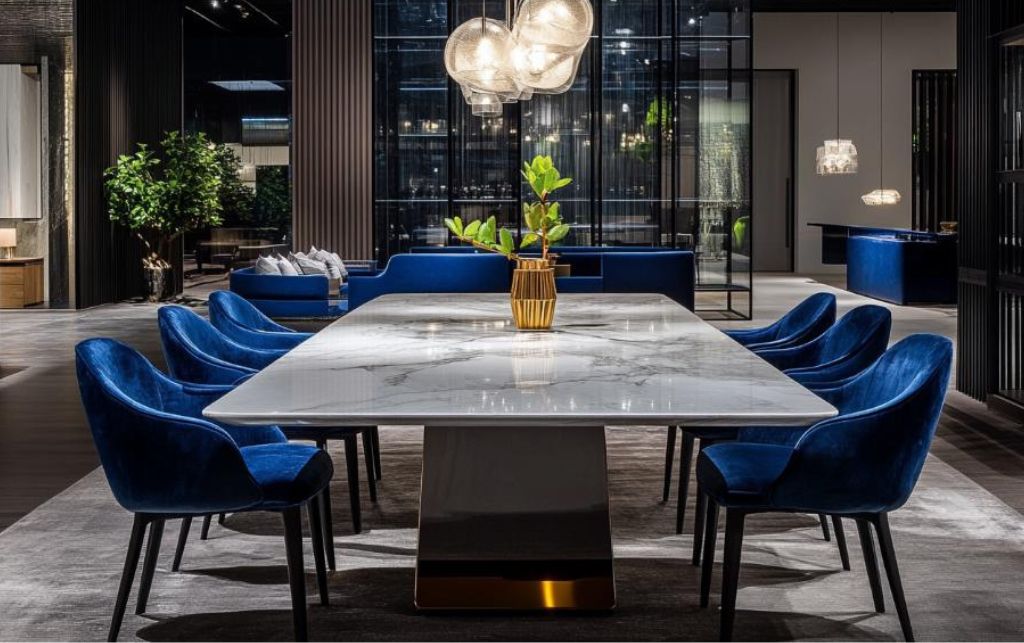
The Versatility of Extendable Tables
One of the most attractive features of the rectangular dining table is its versatility. Extendable designs allow you to seamlessly transition from a smaller, intimate setting to a spacious entertaining space. These tables have evolved significantly, with modern extension mechanisms that are smooth, silent, and can be operated with ease by a single person.
For instance, I recently helped a client extend her elegant marble table, accommodating a larger group of guests without sacrificing style or functionality, making it perfect for her dinner parties and social gatherings.
Base Design Matters: The Importance of Support Structures
While most people focus on the tabletop, the base configuration plays a crucial role in both function and aesthetic appeal. For example, a rectangular pedestal table provides ample legroom while maintaining a balanced visual presence. Without corner legs, these tables are more comfortable and spacious, allowing additional seating where traditional four-legged tables might fall short.
Material Choices: Combining Durability with Style
The material you choose for your dining table is just as important as the shape. It impacts both the tactile quality and the long-term durability of the piece.
Wooden rectangular tables bring warmth and character, with oak being a popular choice due to its ability to develop a beautiful patina over time. Marble tables, on the other hand, offer a striking presence, combining beauty with functionality, especially in terms of heat resistance. For a more dramatic look, black rectangular tables provide a striking contrast, especially in minimalist designs where the table serves as an anchor to the space.
Round Tables: The Ideal for Social Interaction
On the opposite end of the spectrum lies the round dining table. While rectangular tables create clear divisions between guests, round tables break down those barriers. The absence of a head or foot makes the dining experience inherently more egalitarian, fostering open and dynamic conversation among all participants.
Psychologically, the round table creates an inclusive, intimate atmosphere, perfect for gatherings where open dialogue is key. However, larger round tables can present challenges, especially when guests are seated too far apart, making conversation difficult.
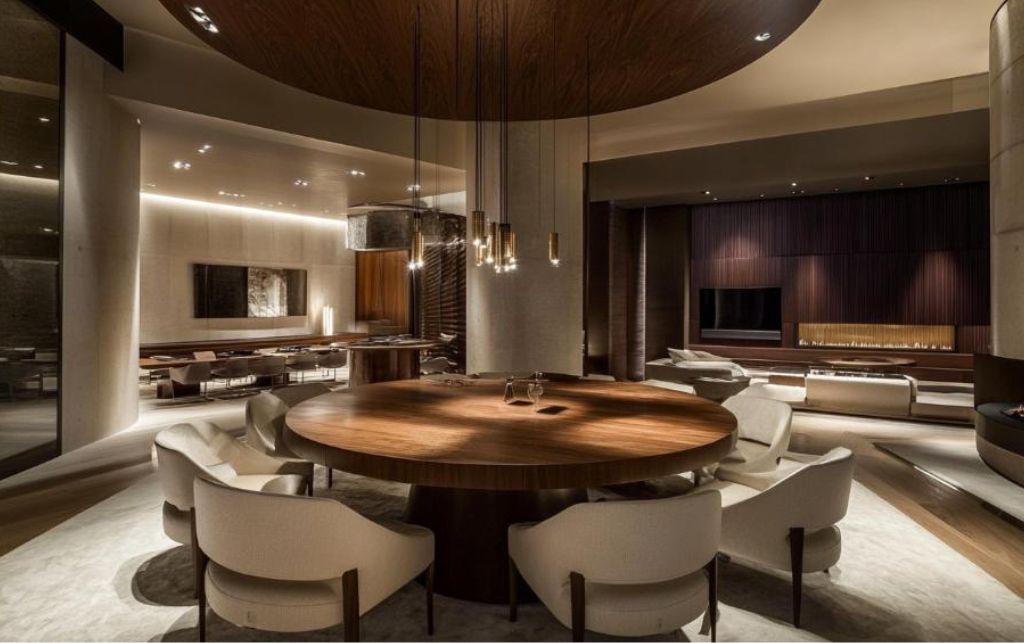
Oval Tables: The Best of Both Worlds
If you're torn between the structured formality of a rectangular table and the social flow of a round one, the oval table might be the perfect compromise. It combines the linear shape of a rectangle with the rounded edges of a circle, creating a balance between functionality and sociability. Oval tables work well in larger spaces and can seat a larger number of guests without the conversation distance issues seen with large round tables.
The soft curves of an oval table can also add a sense of movement to a space that might otherwise feel too rigid or formal, making it ideal for transitional designs that combine traditional and contemporary elements.
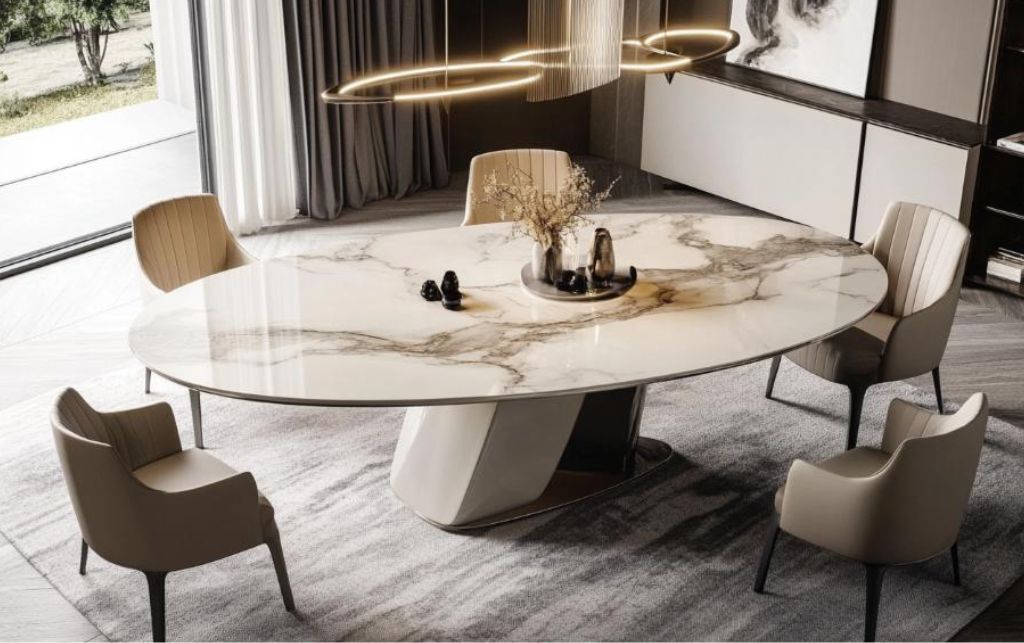
Practical Considerations: Optimizing Your Space
It’s essential to consider the practicality of your space when selecting a dining table. Smaller rectangular tables can fit snugly against walls, saving room for other functions. In long, narrow rooms, the linear form of a rectangular table enhances the room’s proportions, making it feel more balanced.
For square rooms, round tables work well to maintain symmetry, while rectangular tables can feel out of place. When planning space, always allow at least 900mm of clearance from the table to any obstruction. If possible, 1100mm is even better, ensuring both comfortable dining and ease of movement around the table.
The Right Pair: Dining Table and Chairs
Choosing the right chairs for your dining table is just as critical as selecting the table itself. For rectangular tables, a mix of armchairs and armless chairs allows for a balanced arrangement that maintains visual hierarchy and maximizes seating capacity. Round and oval tables, however, benefit from consistent chair designs all around to reinforce the inclusive atmosphere.
Consider how your chair design impacts the overall look. High-backed chairs add formality, while lower backs contribute to a more casual feel.
Final Thoughts: Key Considerations Before You Choose
When clients are uncertain about the right dining table for their home, I encourage them to think through a few key questions:
-
How do you typically entertain? A formal dinner might call for a rectangular table, while a more relaxed gathering could benefit from a round or oval one.
-
How does your room's shape and size influence the choice? The table should complement your room’s proportions and flow.
-
Do your guest numbers fluctuate often? If so, an extendable table might be a necessity.
-
What other design elements need to be considered? Ensure your table complements other furnishings and features in your home.
-
How important is conversation flow? Round and oval tables create a more natural social environment.
Investing in Quality: A Long-Term View
Selecting a dining table is an investment that should last for many years. While staying within budget is important, I recommend prioritizing quality—especially when it comes to construction and materials.
Look for well-crafted joinery in wooden tables, like dovetail or mortise-and-tenon joints. In glass tables, check for quality edge finishing, and in marble, inquire about maintenance and sealing. A well-made dining table will provide decades of service and remain the focal point of countless meaningful moments.
Key Takeaways
When selecting a dining table, consider how the shape influences both social interaction and space usage. A rectangular table works well for formality and space efficiency, while round and oval tables foster inclusivity and fluid conversation.
Ultimately, the dining table is more than just furniture. It’s the heart of your home’s social fabric, where memories are made. By understanding the nuances of each design, you can make a choice that will serve you well for years to come.


